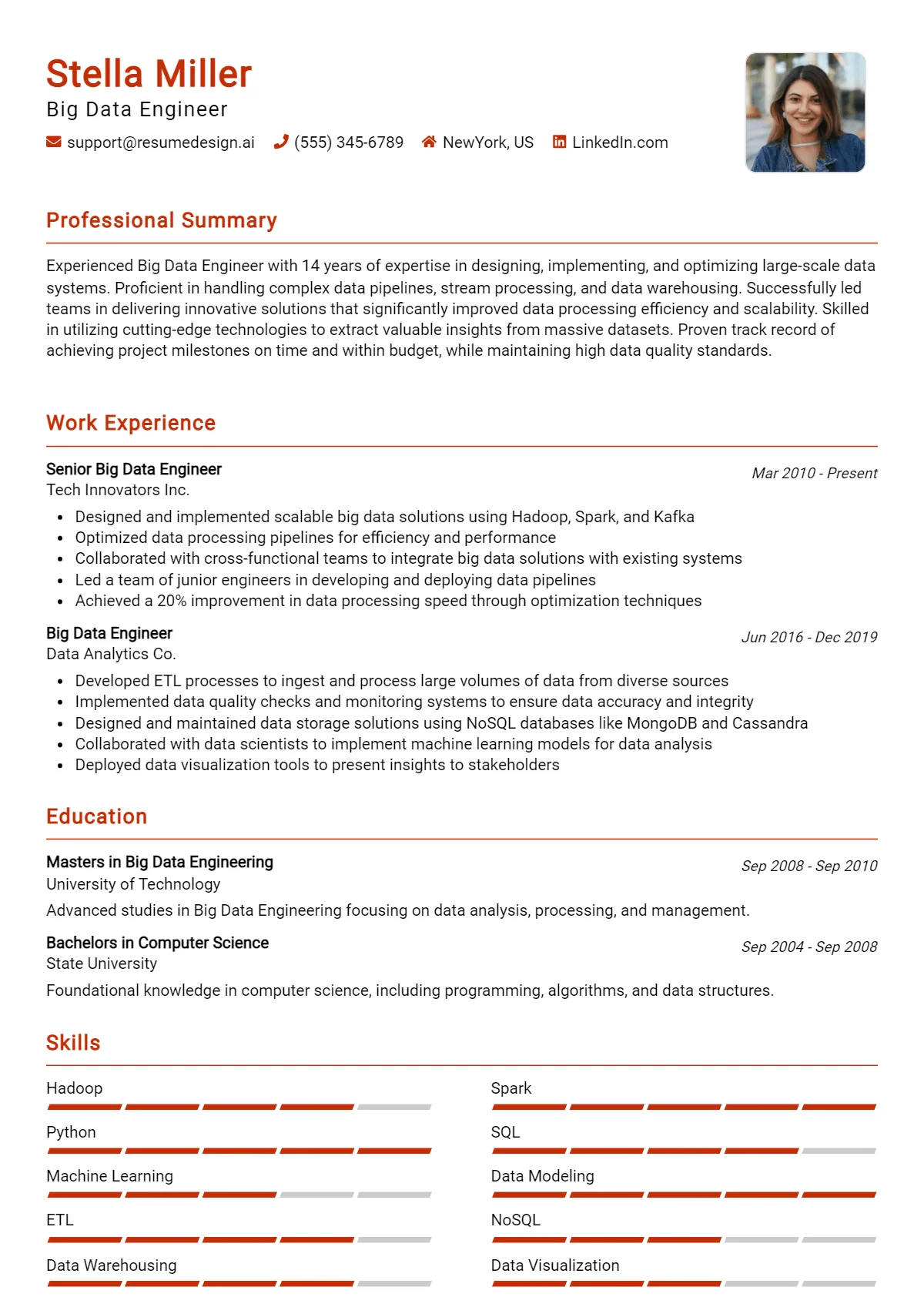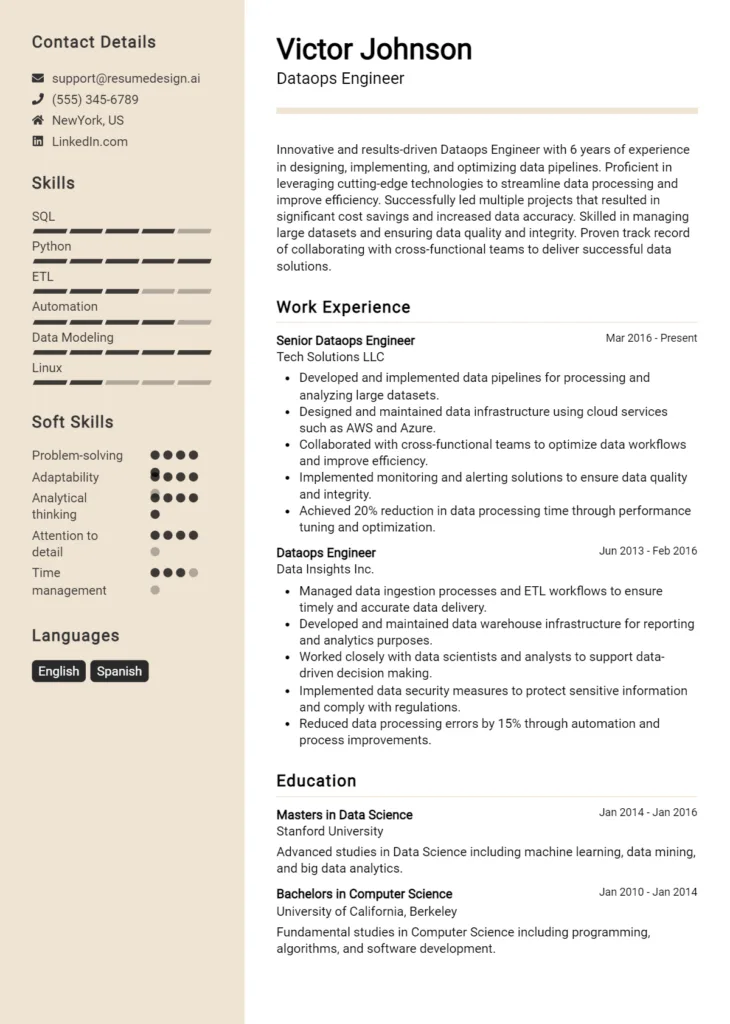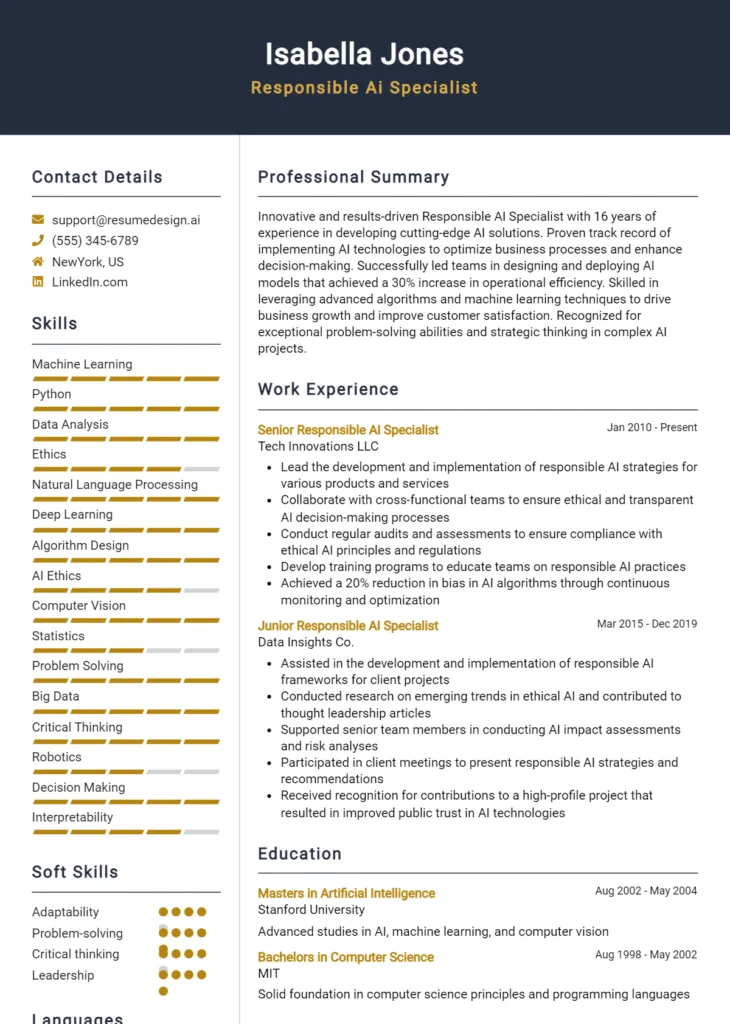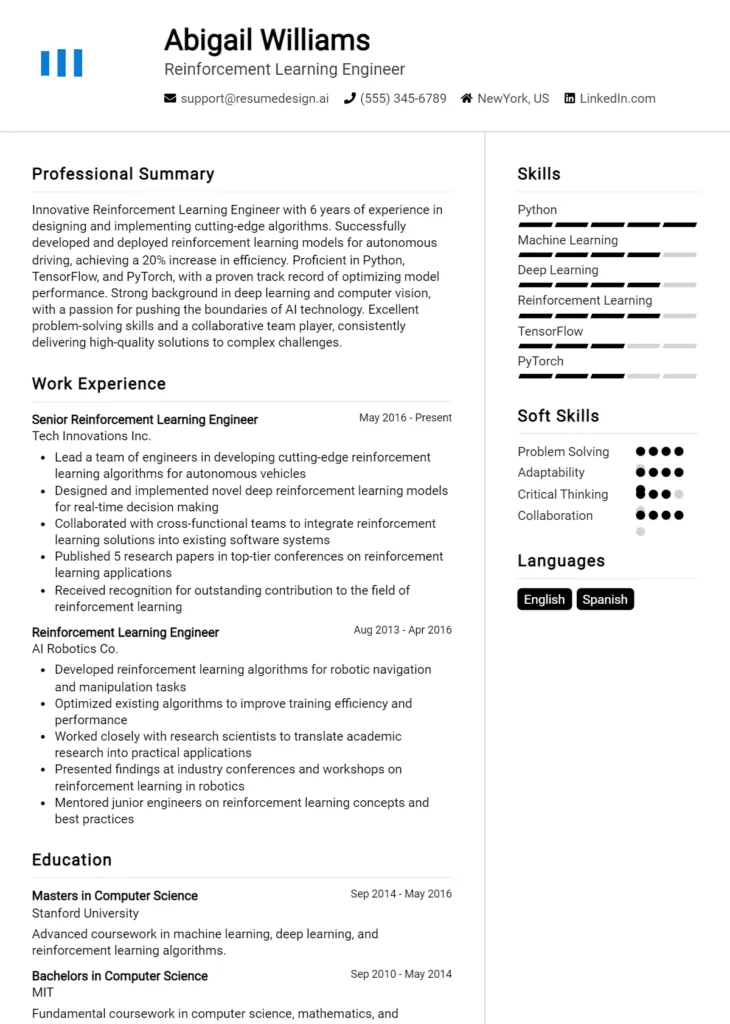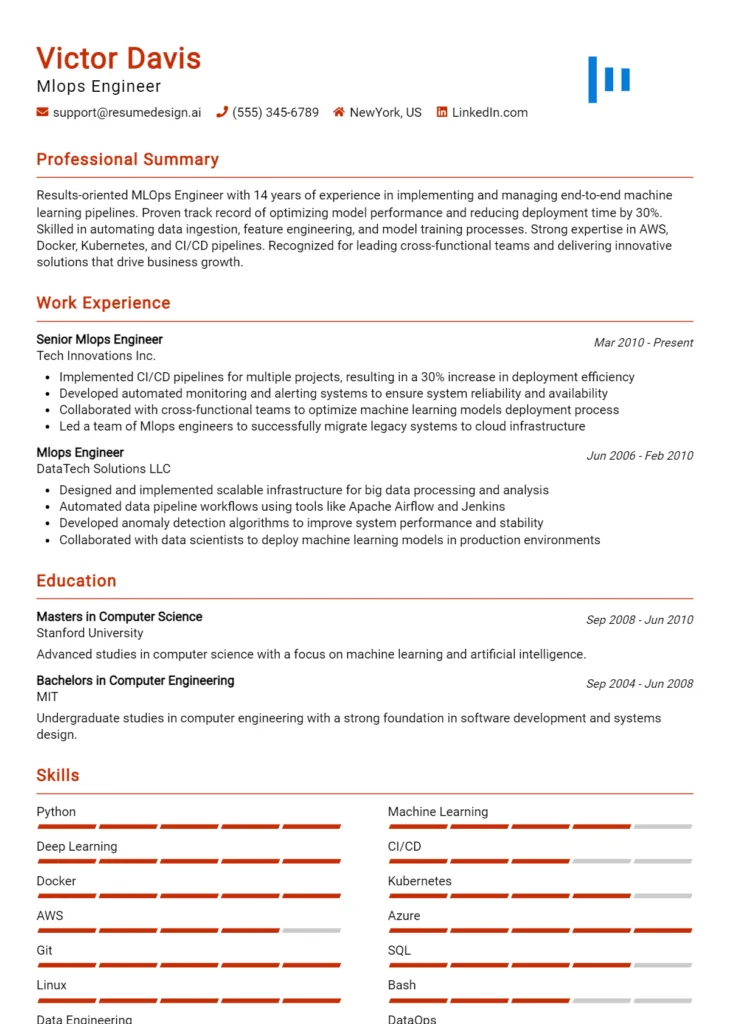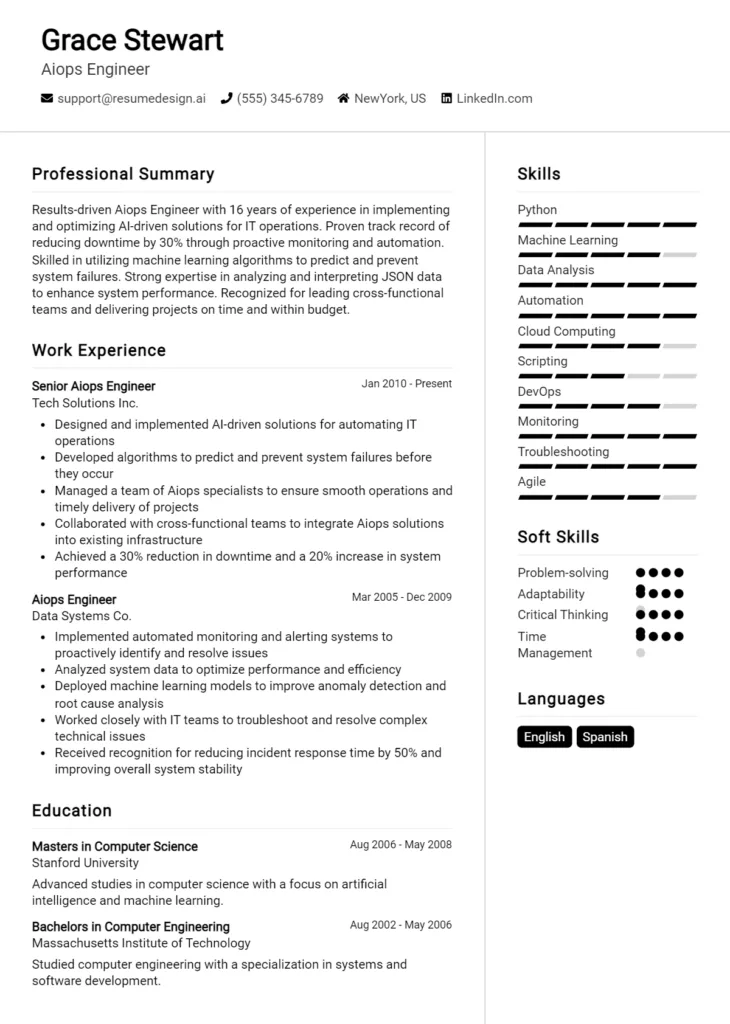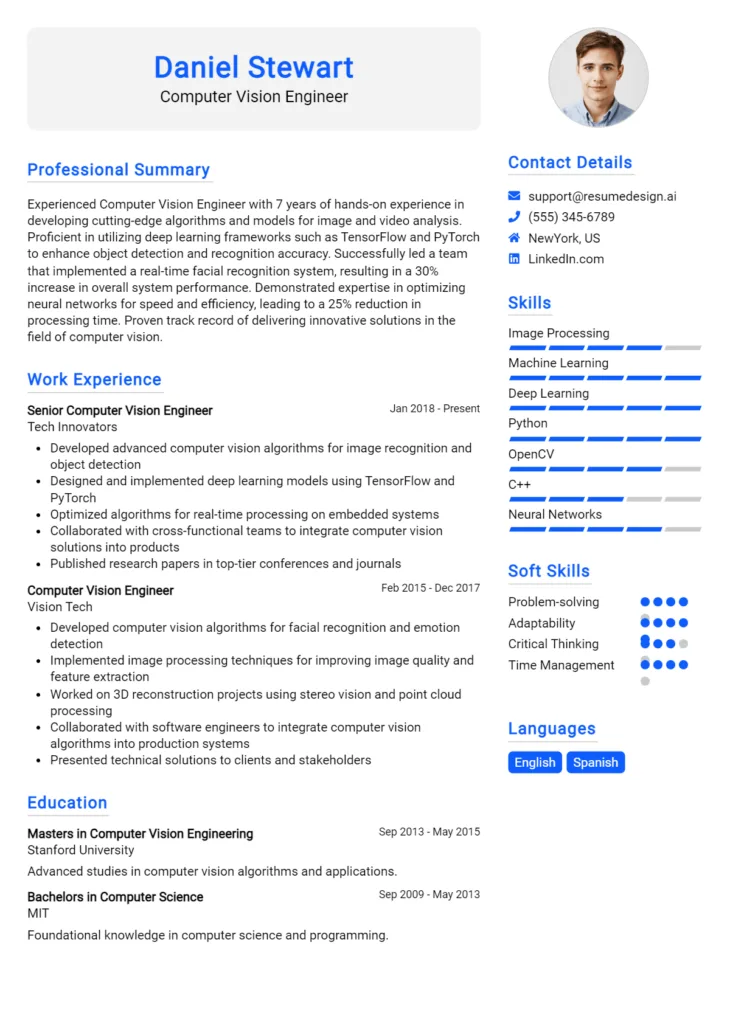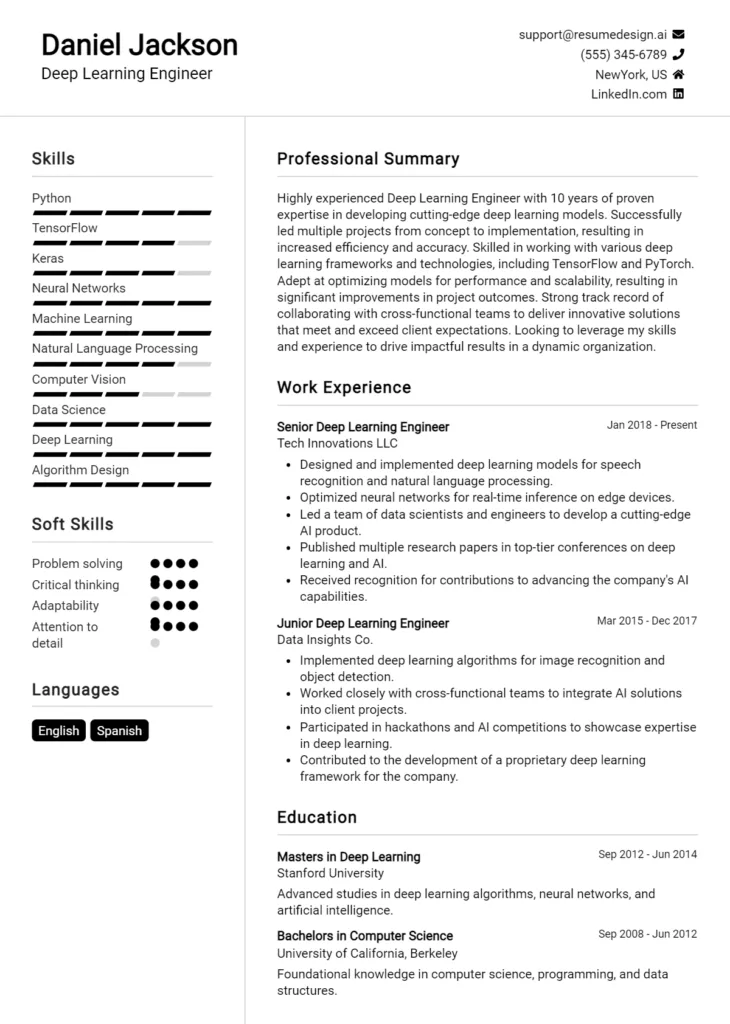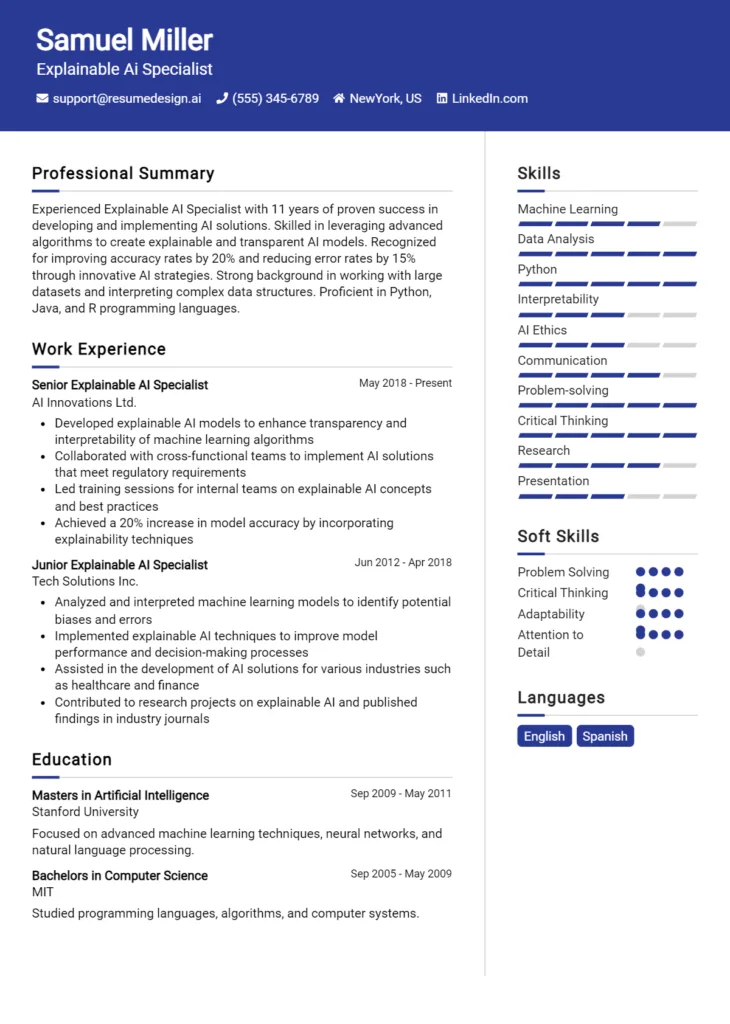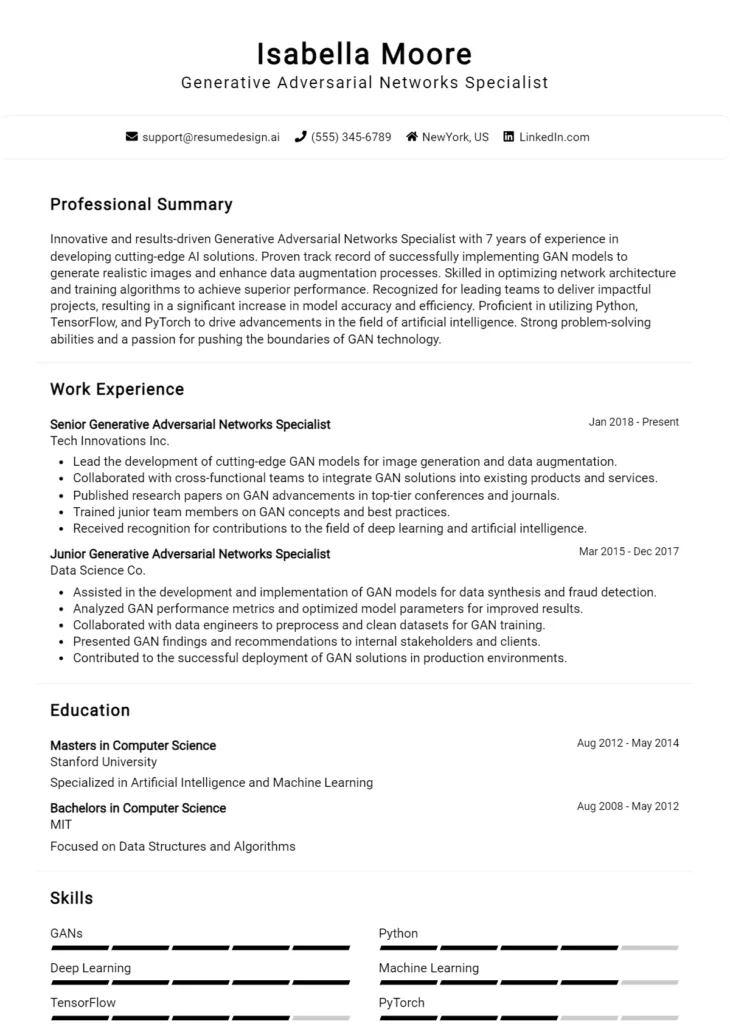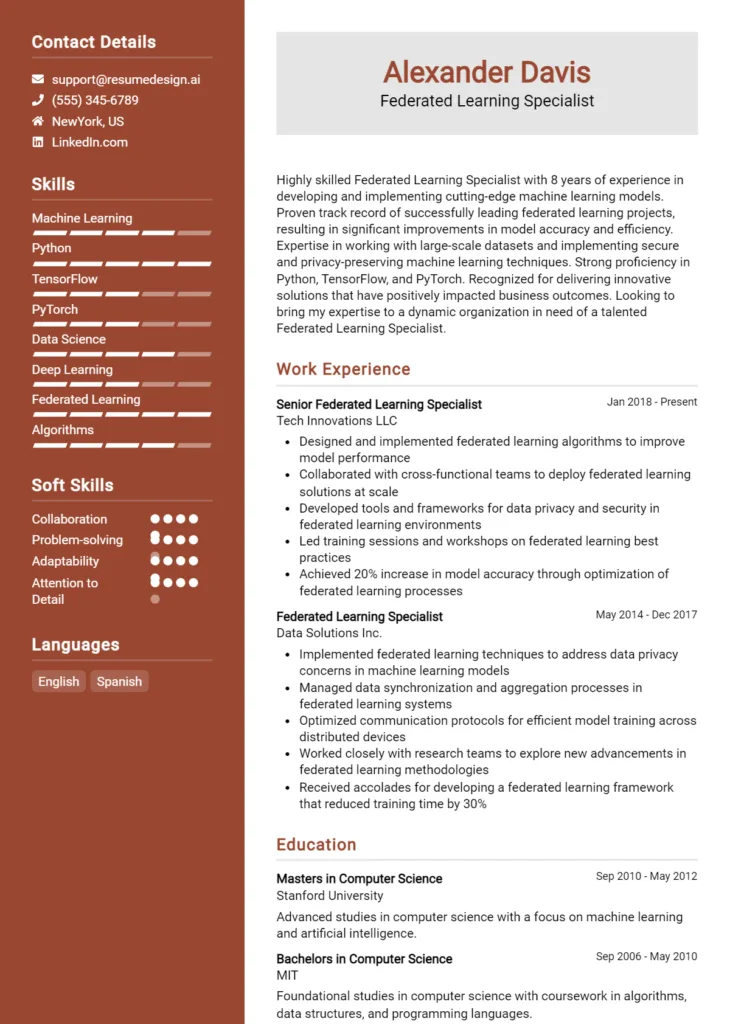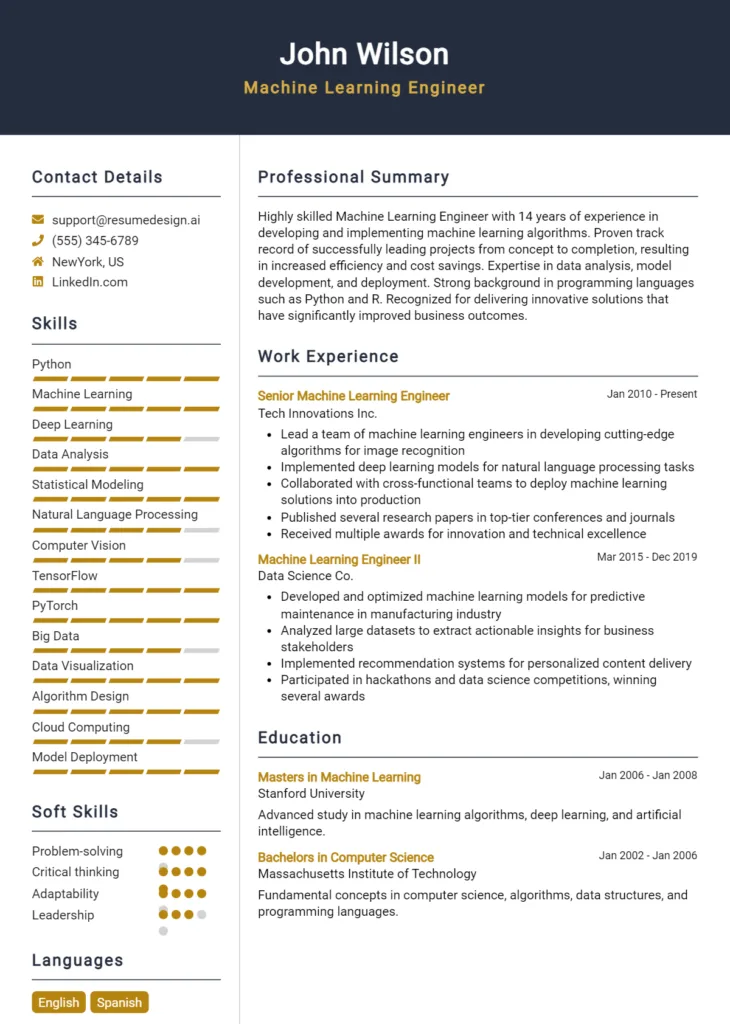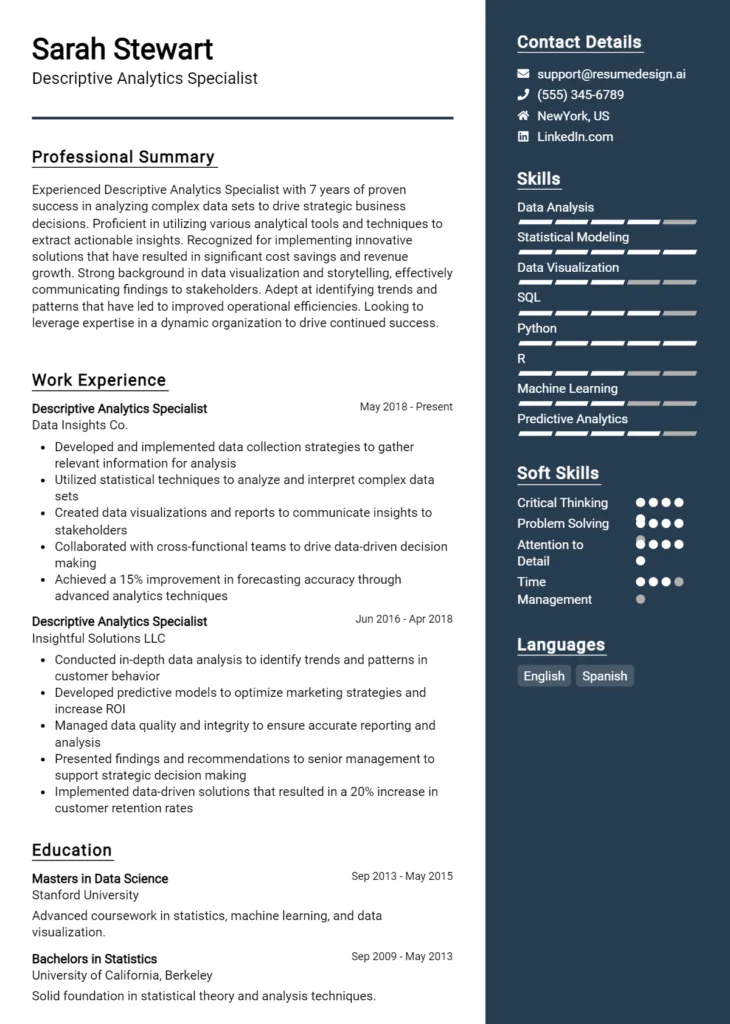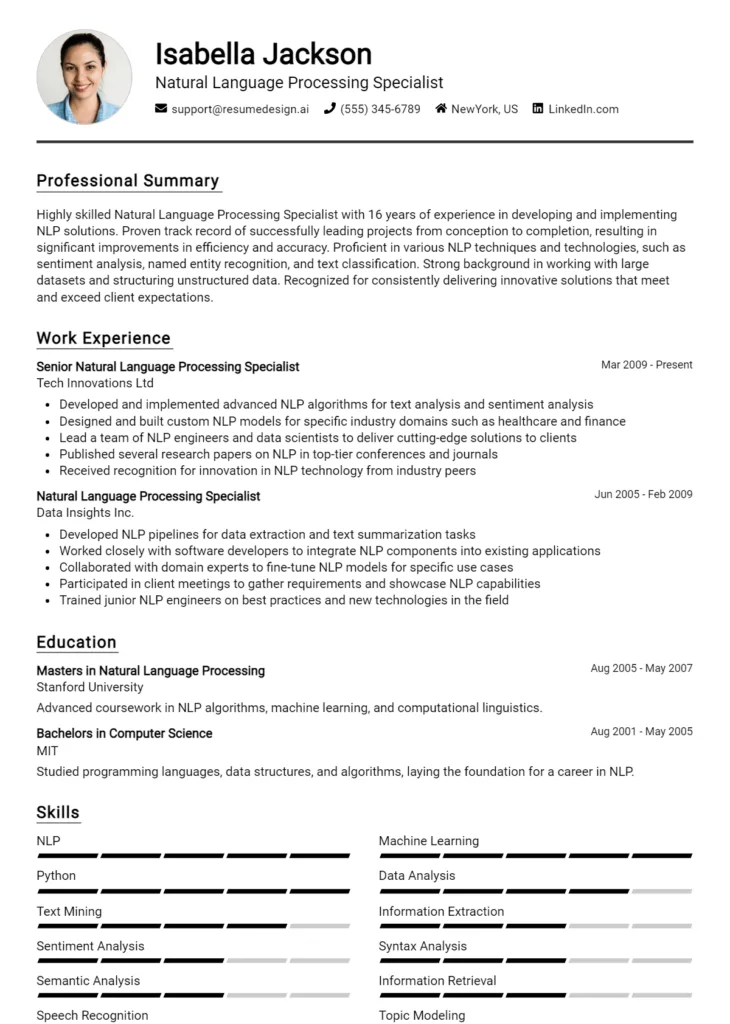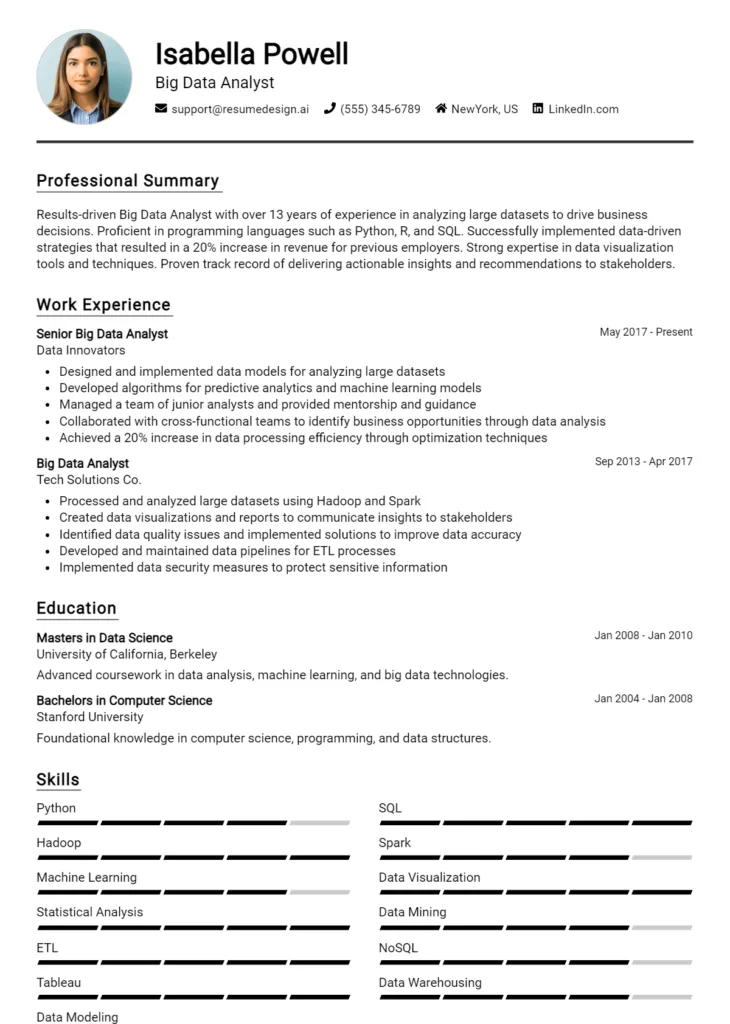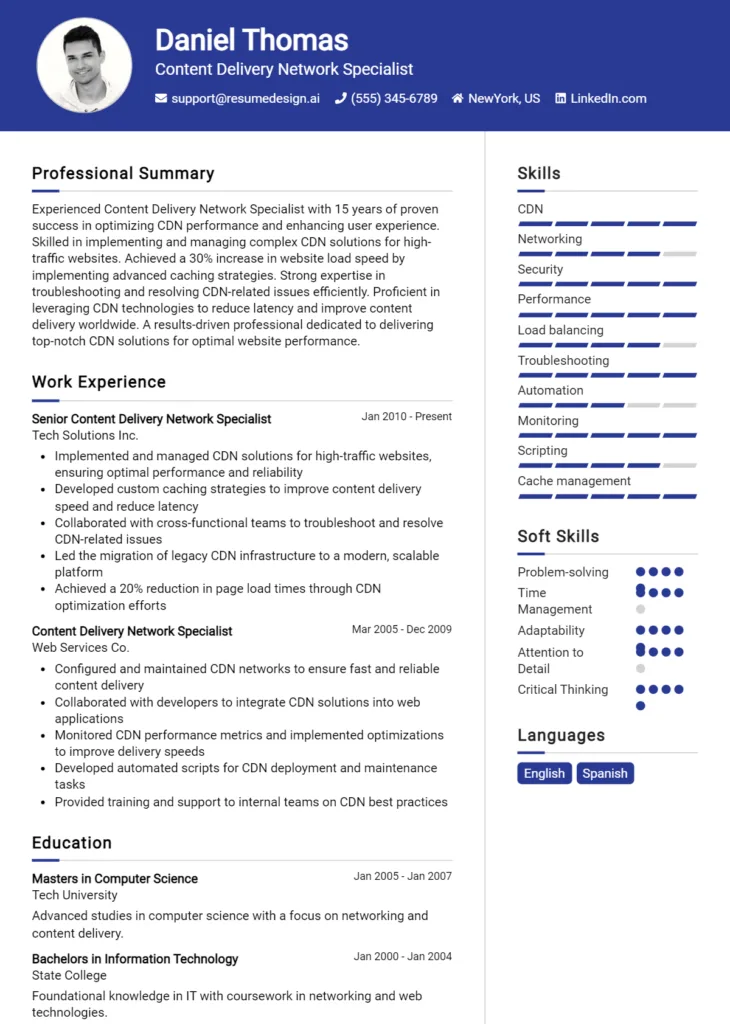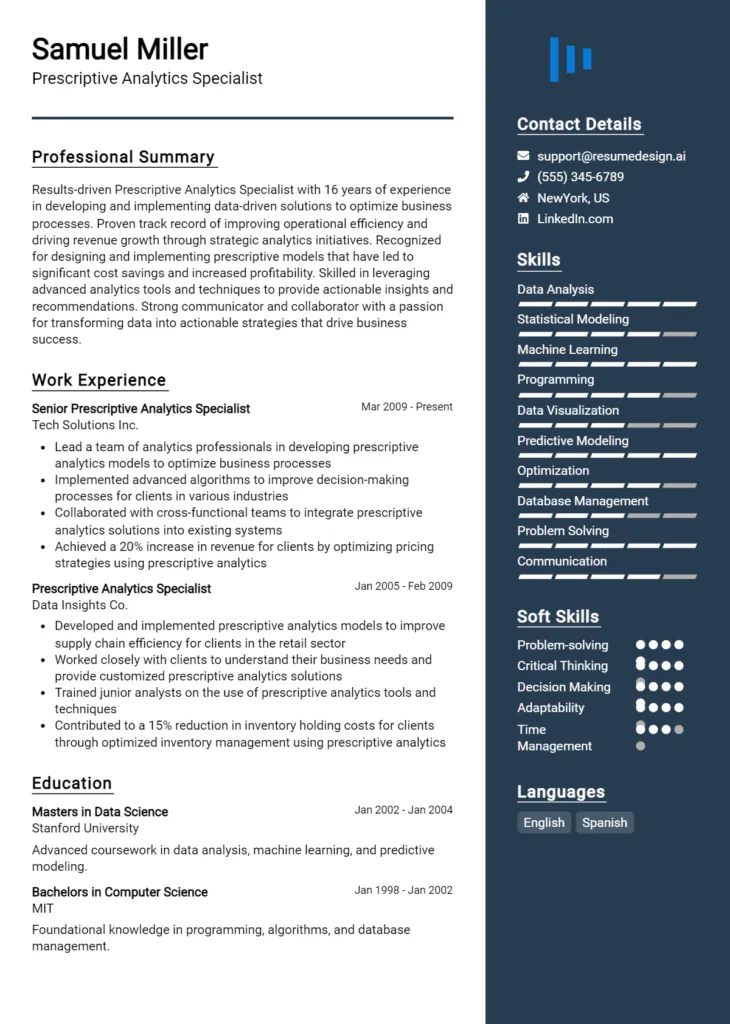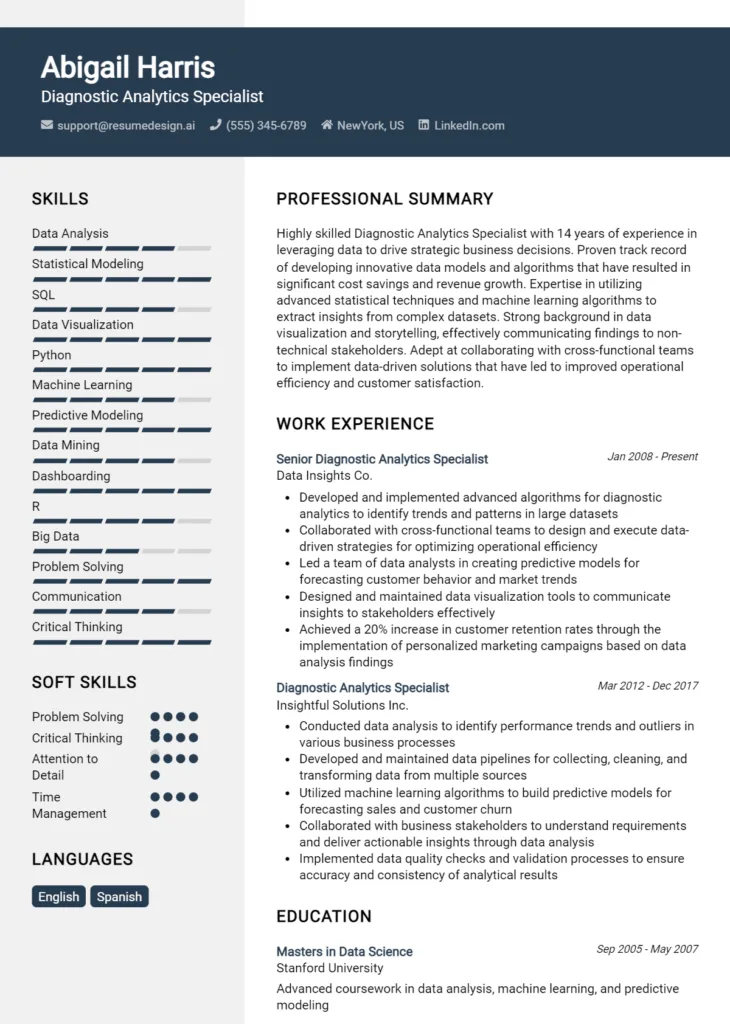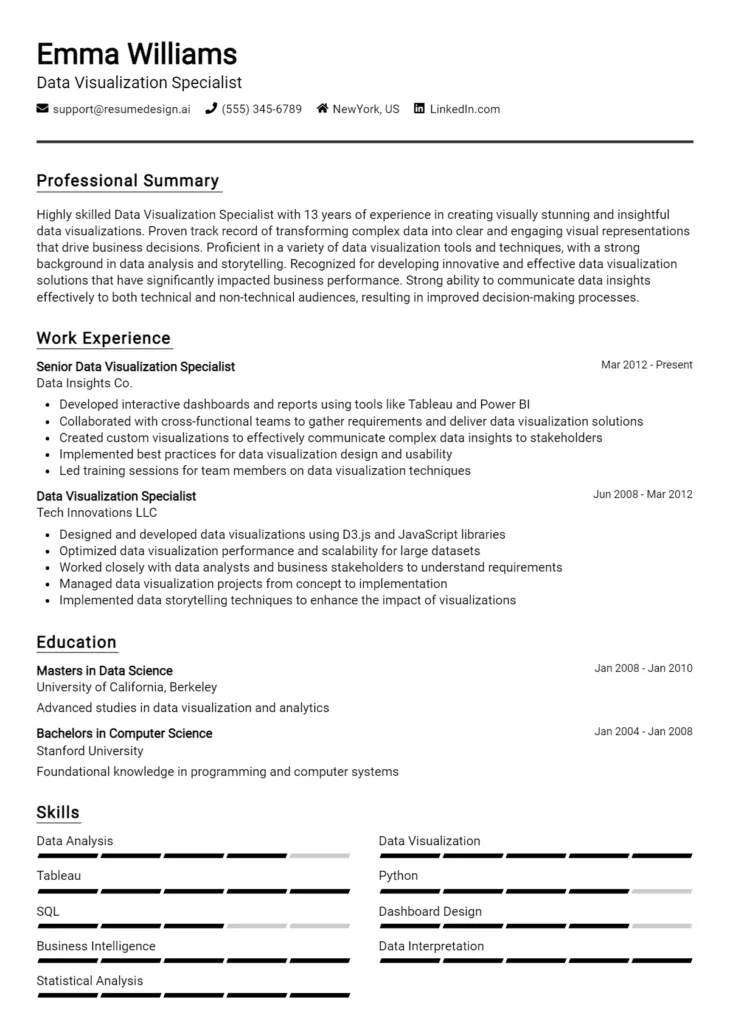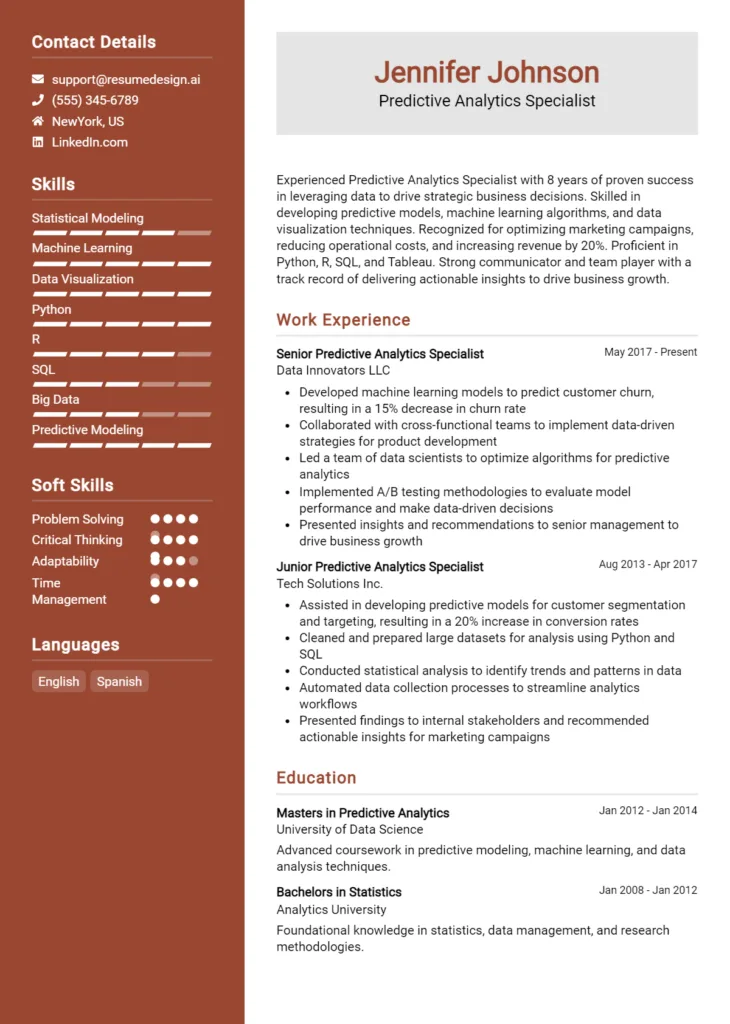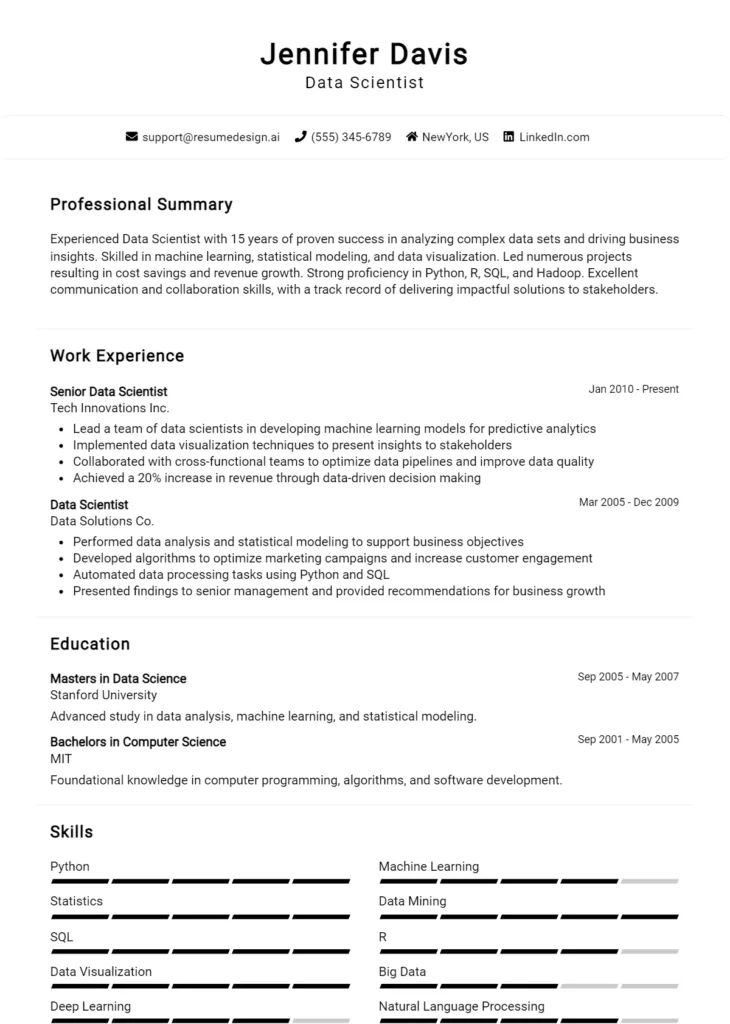Big Data Engineer Core Responsibilities
A Big Data Engineer plays a pivotal role in managing and analyzing vast datasets, effectively bridging the gap between technical teams and business functions. Key responsibilities include designing scalable data architectures, implementing data processing systems, and ensuring data quality. Essential skills encompass proficiency in programming languages like Python and Java, familiarity with big data technologies such as Hadoop and Spark, and strong problem-solving abilities. These competencies are crucial for driving data-driven decision-making within the organization, and a well-structured resume can effectively highlight these qualifications.
Common Responsibilities Listed on Big Data Engineer Resume
- Design and implement robust data pipelines for ETL processes.
- Develop and maintain data warehouse architectures.
- Optimize data storage and retrieval processes for efficiency.
- Collaborate with data scientists and analysts to understand data needs.
- Ensure data integrity and quality across multiple data sources.
- Utilize big data tools like Hadoop, Spark, and Kafka.
- Monitor and troubleshoot performance issues in data systems.
- Implement data security measures and compliance protocols.
- Document data architecture and processes for stakeholder reference.
- Conduct data modeling and analysis to support business objectives.
- Stay updated on industry trends and emerging technologies.
- Train and mentor junior data engineering staff.
High-Level Resume Tips for Big Data Engineer Professionals
In today's competitive job market, a well-crafted resume is paramount for Big Data Engineer professionals. This crucial document often serves as the first impression a candidate makes on potential employers, making it essential to accurately reflect both skills and achievements. A resume that effectively communicates expertise in big data technologies, analytical thinking, and problem-solving abilities can set candidates apart in a crowded field. This guide will provide practical and actionable resume tips specifically tailored for Big Data Engineer professionals, ensuring that their qualifications shine through.
Top Resume Tips for Big Data Engineer Professionals
- Tailor your resume to the job description by incorporating relevant keywords and phrases from the posting.
- Highlight your technical skills, such as proficiency in Hadoop, Spark, SQL, and other big data tools.
- Showcase your experience with data architecture, ETL processes, and data modeling to demonstrate your expertise.
- Quantify your achievements by using metrics, such as data processing speeds, cost reductions, or improvements in data accuracy.
- Include specific projects you’ve worked on, detailing your role and the technologies used to achieve successful outcomes.
- Emphasize your problem-solving skills by providing examples of how you overcame data challenges in previous positions.
- Incorporate certifications and advanced degrees relevant to big data engineering to bolster your qualifications.
- Utilize clear, concise language and a clean format to ensure your resume is easy to read and visually appealing.
- Focus on continuous learning and staying updated with industry trends, showing your commitment to growth in the field.
By implementing these tips, Big Data Engineer professionals can significantly increase their chances of landing a job in this thriving field. A resume that effectively showcases relevant experience, skills, and achievements will resonate with hiring managers, leading to more opportunities for interviews and career advancement.
Why Resume Headlines & Titles are Important for Big Data Engineer
In the competitive field of Big Data Engineering, crafting an impactful resume headline or title is crucial for making a strong first impression. A well-structured headline serves as a powerful hook that captures the attention of hiring managers and succinctly summarizes a candidate's key qualifications in a single, impactful phrase. It should be concise, relevant, and directly aligned with the specific job being applied for, ensuring that it sets the tone for the rest of the resume and encourages further reading.
Best Practices for Crafting Resume Headlines for Big Data Engineer
- Keep it concise: Aim for one to two lines that summarize your qualifications.
- Be role-specific: Use terminology and keywords that are relevant to the Big Data Engineer position.
- Highlight key skills: Include your most pertinent skills that align with the job description.
- Showcase achievements: If possible, incorporate measurable accomplishments to demonstrate your impact.
- Use action-oriented language: Start with strong verbs to convey proactivity and expertise.
- Tailor for each application: Customize your headline to match the specific requirements of the job.
- Be clear and direct: Avoid jargon that may confuse the reader; clarity is key.
- Reflect your unique value: Make sure your headline stands out by emphasizing what makes you unique as a candidate.
Example Resume Headlines for Big Data Engineer
Strong Resume Headlines
"Results-Driven Big Data Engineer with 5+ Years of Experience in Data Pipeline Development"
“Expert in Apache Spark and Hadoop Ecosystem, Focused on Scalable Data Solutions”
“Innovative Big Data Engineer Specializing in Machine Learning and Predictive Analytics”
Weak Resume Headlines
“Looking for a Job in IT”
“Big Data Professional”
The strong headlines are effective because they clearly convey the candidate's expertise, specific skills, and the value they bring to potential employers. They are tailored, impactful, and relevant, immediately informing the hiring manager about the candidate's qualifications. In contrast, the weak headlines lack specificity and do not provide any insight into the candidate's unique strengths or value proposition, making them forgettable and ineffective in a competitive job market.
Writing an Exceptional Big Data Engineer Resume Summary
A well-crafted resume summary is crucial for a Big Data Engineer, as it serves as the first impression a hiring manager will have of a candidate. In today's competitive job market, a strong summary quickly captures attention by succinctly showcasing relevant skills, experiences, and accomplishments. It acts as a powerful elevator pitch that highlights the candidate's ability to drive results in the field of big data. A concise and impactful summary tailored to the specific job can significantly enhance the chances of landing an interview, making it essential for candidates to invest time in crafting this section of their resume.
Best Practices for Writing a Big Data Engineer Resume Summary
- Quantify Achievements: Use numbers and metrics to demonstrate your impact and effectiveness in previous roles.
- Focus on Key Skills: Highlight technical skills relevant to big data such as programming languages, tools, and methodologies.
- Tailor to the Job Description: Customize your summary to align with the specific requirements and desired qualifications mentioned in the job listing.
- Be Concise: Keep your summary brief, ideally between 2-4 sentences, ensuring it is easy to read at a glance.
- Showcase Relevant Experience: Include specific examples of past roles or projects that relate directly to the position you are applying for.
- Highlight Soft Skills: Mention important soft skills like teamwork, problem-solving, and communication that complement your technical abilities.
- Use Action Verbs: Start sentences with strong action verbs to convey confidence and proactivity.
- Avoid Jargon: While technical terms are important, ensure the summary is accessible and understandable to a broader audience.
Example Big Data Engineer Resume Summaries
Strong Resume Summaries
Results-driven Big Data Engineer with over 5 years of experience in designing and optimizing data processing systems. Successfully improved data retrieval times by 30% through the implementation of a new ETL pipeline using Apache Spark.
Detail-oriented Big Data Engineer skilled in Hadoop ecosystem, with a proven track record of managing datasets exceeding 10TB. Developed predictive models that increased operational efficiency by 25% while reducing costs by 15%.
Innovative Big Data Engineer with expertise in Python and SQL, who has led cross-functional teams to deliver data-driven insights. Spearheaded a project that enhanced data analytics capabilities, resulting in a 20% boost in customer satisfaction scores.
Weak Resume Summaries
Experienced engineer looking for opportunities in data. I have worked with various technologies and am a good team player.
Big Data Engineer with some experience in the field. I am interested in data-related jobs and have basic skills in data processing.
The examples of strong resume summaries are effective because they provide specific achievements, quantify results, and clearly demonstrate the candidate's relevance to the Big Data Engineer role. In contrast, the weak summaries lack detail and specificity, making them vague and unmemorable. They fail to highlight unique skills or measurable outcomes, which diminishes their impact and effectiveness in capturing a hiring manager's attention.
Work Experience Section for Big Data Engineer Resume
The work experience section of a Big Data Engineer resume is crucial as it serves as a testament to the candidate's technical prowess and practical abilities in the field. This section effectively showcases the candidate's hands-on experience with big data technologies, their capacity to lead teams, and their success in delivering high-quality products that meet industry standards. By quantifying achievements and aligning past roles with the expectations of the industry, candidates can provide potential employers with a clear picture of their capabilities and contributions to previous projects.
Best Practices for Big Data Engineer Work Experience
- Highlight relevant technical skills such as proficiency in Hadoop, Spark, Kafka, and cloud platforms.
- Quantify achievements with metrics, such as percentage improvements in data processing times or cost savings achieved.
- Emphasize leadership experience by detailing team management, mentorship roles, or project leadership.
- Showcase collaboration by noting partnerships with cross-functional teams, such as data scientists and business analysts.
- Use action verbs to convey impact, such as "developed," "designed," "implemented," and "optimized."
- Align experiences with industry standards and trends to demonstrate awareness and adaptability.
- Include relevant certifications or training that enhance credibility in big data technologies.
- Tailor the experience section for each job application to closely match the job description and required skills.
Example Work Experiences for Big Data Engineer
Strong Experiences
- Led a team of 5 data engineers to develop a real-time analytics platform, reducing data processing time by 40% and increasing report generation efficiency by 50%.
- Implemented a machine learning model that improved customer segmentation, resulting in a 25% increase in targeted marketing campaign ROI.
- Designed and optimized ETL processes for a major retail client, decreasing data integration time from 24 hours to 1 hour, saving the company $200,000 annually.
Weak Experiences
- Worked on various data projects with some team members.
- Assisted in data processing tasks as needed.
- Involved in the implementation of data solutions without specific details.
The examples provided demonstrate the distinction between strong and weak experiences based on clarity and impact. Strong experiences are characterized by specific, quantifiable achievements that reflect leadership and technical expertise, while weak experiences are vague, lacking in detail, and fail to convey the candidate's contributions or skills effectively. This contrast highlights the importance of articulating one's work history in a way that resonates with potential employers and aligns with industry expectations.
Education and Certifications Section for Big Data Engineer Resume
The education and certifications section of a Big Data Engineer resume is crucial as it serves as a testament to the candidate's academic background and commitment to the field. This section not only highlights the degrees earned but also showcases industry-relevant certifications and any specialized training undertaken to stay abreast of evolving technologies. By providing information on relevant coursework and certifications, candidates can significantly enhance their credibility and demonstrate their alignment with the specific demands of the Big Data Engineer role, ultimately making them more attractive to potential employers.
Best Practices for Big Data Engineer Education and Certifications
- Focus on relevant degrees in Computer Science, Data Science, or related fields.
- Highlight industry-recognized certifications such as AWS Certified Big Data, Google Cloud Professional Data Engineer, or Cloudera Certified Professional.
- Include specialized training or boot camps that cover key big data technologies like Hadoop, Spark, or Kafka.
- Detail relevant coursework that demonstrates proficiency in data engineering concepts and tools.
- Ensure certifications are up-to-date and reflect current industry standards.
- Use clear formatting to make this section easy to read and navigate.
- Consider including GPA if it is impressive and relevant to the field.
- List certifications in order of relevance to the job description, prioritizing the most impactful ones.
Example Education and Certifications for Big Data Engineer
Strong Examples
- M.S. in Data Science, University of California, Berkeley, 2021
- AWS Certified Big Data - Specialty, 2023
- Professional Certificate in Data Engineering, Google Cloud Training, 2022
- Relevant Coursework: Advanced Data Mining, Distributed Systems, Machine Learning Algorithms
Weak Examples
- B.A. in History, State University, 2010
- Certification in Microsoft Office Suite, 2019
- Diploma in Web Development, Online Course, 2020
- Coursework: Introduction to Philosophy, Basic Statistics
The strong examples are considered relevant because they reflect advanced degrees and certifications that align directly with the skills and knowledge needed for a Big Data Engineer position. They demonstrate a focused educational path and a commitment to ongoing professional development within the industry. In contrast, the weak examples highlight qualifications that are either outdated, irrelevant to the field, or do not provide any substantial value in the context of data engineering, thereby failing to enhance the candidate's profile effectively.
Top Skills & Keywords for Big Data Engineer Resume
In the rapidly evolving landscape of data management, the role of a Big Data Engineer is both critical and multifaceted. A strong resume for this position not only highlights technical expertise but also showcases a blend of soft skills that facilitate collaboration, problem-solving, and innovation. Employers seek candidates who can navigate complex data systems while also effectively communicating insights and working within diverse teams. Therefore, showcasing the right skills on a Big Data Engineer resume can significantly enhance a candidate's prospects in a competitive job market.
Top Hard & Soft Skills for Big Data Engineer
Soft Skills
- Problem-solving
- Communication
- Team collaboration
- Adaptability
- Critical thinking
- Time management
- Attention to detail
- Creativity
- Leadership
- Project management
Hard Skills
- Proficiency in programming languages (e.g., Python, Java, Scala)
- Experience with big data technologies (e.g., Hadoop, Spark, Kafka)
- Data warehousing solutions (e.g., Amazon Redshift, Google BigQuery)
- ETL (Extract, Transform, Load) processes
- Database management (e.g., SQL, NoSQL)
- Cloud services (e.g., AWS, Azure, Google Cloud)
- Data modeling and architecture
- Data visualization tools (e.g., Tableau, Power BI)
- Machine learning algorithms
- Familiarity with data governance and security best practices
By focusing on these essential skills, candidates can create a powerful resume that effectively communicates their qualifications and aligns with the expectations of potential employers. For additional guidance on enhancing your resume with relevant skills and showcasing your work experience, consider exploring tailored resources that can further refine your application.
Stand Out with a Winning Big Data Engineer Cover Letter
Dear [Hiring Manager's Name],
I am writing to express my interest in the Big Data Engineer position at [Company Name] as advertised on [Job Portal/Company Website]. With a strong background in computer science and hands-on experience in designing, implementing, and optimizing large-scale data processing systems, I am excited about the opportunity to contribute to your team. My expertise in tools such as Apache Hadoop, Spark, and Kafka, combined with my proficiency in SQL and NoSQL databases, enables me to extract actionable insights from complex datasets, driving data-driven decisions.
In my previous role at [Previous Company Name], I successfully led a project that involved migrating legacy data systems to a cloud-based architecture, resulting in a 30% reduction in processing time and improved data accessibility for cross-functional teams. My collaborative approach allowed me to work closely with data scientists, analysts, and business stakeholders to develop a comprehensive data pipeline that supports real-time analytics. I am particularly proud of my ability to identify bottlenecks and implement efficient data workflows that enhance overall system performance.
I am drawn to [Company Name] because of your commitment to innovation and your focus on leveraging big data to create impactful solutions. I am eager to bring my technical expertise in big data technologies and my passion for continuous learning to your dynamic team. I am confident that my problem-solving skills and proactive mindset will make a significant contribution to your ongoing projects and initiatives.
Thank you for considering my application. I look forward to the opportunity to discuss how my experience and vision align with the goals of [Company Name]. I am excited about the possibility of joining your team and contributing to your success in harnessing the power of big data.
Sincerely,
[Your Name]
[Your Contact Information]
[LinkedIn Profile or Portfolio URL]
Common Mistakes to Avoid in a Big Data Engineer Resume
In today's competitive job market, crafting a standout resume as a Big Data Engineer is crucial for landing your dream job. However, many candidates make common mistakes that can hinder their chances of getting noticed by recruiters. Understanding these pitfalls can help you present your skills and experiences more effectively, ensuring your resume reflects your qualifications in the best light. Here are some common mistakes to avoid:
Lack of Tailoring: Failing to customize your resume for each job application can make it seem generic. Highlight specific skills and experiences that align with the job description.
Overloading with Technical Jargon: While it's important to showcase your technical skills, using excessive jargon can make your resume hard to read. Balance technical terms with clear explanations to appeal to both technical and non-technical recruiters.
Ignoring Soft Skills: Focusing solely on technical abilities can overlook important soft skills like communication and teamwork. Include examples that demonstrate your interpersonal skills and collaborative experiences.
Vague Job Descriptions: Listing responsibilities without clarity can dilute the impact of your experience. Use quantifiable achievements and specific projects to showcase your contributions.
Neglecting Formatting: A cluttered or unprofessional format can detract from your content. Use consistent fonts, bullet points, and spacing to make your resume visually appealing and easy to navigate.
Omitting Relevant Projects: Many Big Data Engineers work on side projects or contribute to open-source. Failing to mention these can overlook valuable experience. Include relevant projects that demonstrate your competence and passion.
Listing Technologies Without Context: Simply listing technologies without context doesn't convey your proficiency. Instead, describe how you've used these technologies in your work and the impact they had.
Not Including Continuous Learning: The tech field is ever-evolving, and not mentioning ongoing education or certifications can make you appear stagnant. Highlight any recent courses, certifications, or workshops that show your commitment to staying current.
Conclusion
As we conclude our exploration of the Big Data Engineer role, it's clear that this position requires a unique blend of technical expertise, problem-solving skills, and a strong understanding of data architecture and processing frameworks. Key responsibilities include designing and maintaining scalable data systems, working with large data sets, and ensuring the integrity and accessibility of data for analytics purposes.
In this fast-evolving field, staying updated with the latest tools and technologies is vital. Additionally, effective communication with stakeholders and collaboration with data scientists and analysts are essential for success in this role.
Now is the perfect time to reflect on your own qualifications and experiences as a Big Data Engineer. To ensure your resume stands out in this competitive job market, consider utilizing available resources. Check out resume templates to create a visually appealing layout, or use the resume builder for a guided approach. Looking for inspiration? Visit resume examples to see how other professionals present their skills. Don't forget to enhance your application with a strong introduction using cover letter templates.
Take action today and revamp your Big Data Engineer resume to reflect your expertise and readiness for the next opportunity!

